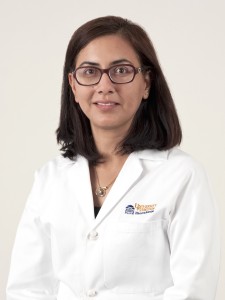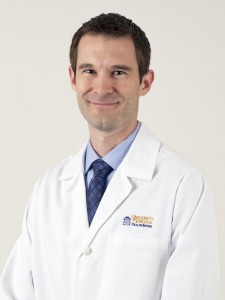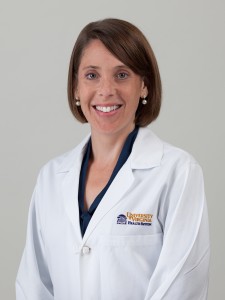By adding new faculty members with unique subspecialties and advanced training, the UVA Pediatric Neurology Program continues to expand its services and further its ability to provide comprehensive care to young patients with neurologic disorders. “We have been fortunate over the past couple of years to add several new faculty who continue our program’s tradition of excellence,” says Howard Goodkin, MD, PhD, director of the Division of Pediatric Neurology. The three most recent additions to the program include:
 Radhika Dhamija, MBBS, MD
Radhika Dhamija, MBBS, MD
Assistant Professor, Department of Neurology
Specialty: Neurocutaneous disorders, including neurofibromatosis and schwannomatosis
Fellowship: Department of Medical Genetics, Mayo Clinic College of Medicine, Rochester, Minn.
Residency: Division of Child and Adolescent Neurology, Mayo Clinic College of Medicine, Rochester, Minn.
Medical Degree: Bachelor of Medicine and Bachelor of Surgery (MBBS) at the All India Institute of Medical Sciences (AIIMS), New Delhi, India
Radhika Dhamija, MBBS, MD, is dually trained in both genetics and pediatric neurology, a rare subspecialty and invaluable foundation when caring for children with conditions like neurofibromatosis, fragile X syndrome, epilepsy and other genetic neurologic disorders. “These diseases are not new, but before we could not easily test or prove a genetic basis,” says Dhamija. “Because we now know the genetic basis for the disease, we can offer treatment that is more targeted.”
For example, some genetic neurologic conditions are multisystemic and may eventually impact other organs. Even if the condition is not curable, being able to accurately identify the disease and predict its progression allows providers to take a proactive approach to managing symptoms and potential complications.
Research into these types of treatments, which leverage the genetic makeup of disease, is ongoing, and Dhamija believes UVA is well positioned for making progress in this area. “Because of the high volumes at UVA, there is a greater potential for research, so future trials are a definite possibility,” she says.
In clinic, Dhamija works closely with a genetic counselor to educate and evaluate patients and family members. Yet because she is also a practicing neurologist, her care extends beyond genetic testing and diagnosis to the comprehensive management of neurologic disorders. As part of UVA’s extensive network of skilled pediatric and neurologic providers, she has the ability to refer as needed to neurosurgery or multidisciplinary clinics specializing in conditions like Huntington’s or tuberous sclerosis. “To have a neurogenetics program, you have to have a strong neurology program,” says Dhamija. “It’s all about collaboration.”
Listen to a recent podcast featuring Radhika Dhamija, MD, that highlights the importance of genetic testing.
 J. Nicholas Brenton, MD
J. Nicholas Brenton, MD
Assistant Professor of Neurology
Specialty: Epilepsy and pediatric-onset multiple sclerosis
Fellowship: Neurophysiology, The Ohio State University/Nationwide Children’s Hospital, Columbus, Ohio
Pediatric Multiple Sclerosis and Related Demyelinating Diseases, Children’s Hospital of Philadelphia, Philadelphia, Penn.
Residency: Pediatrics and Child Neurology, University of Virginia School of Medicine, Charlottesville, Va.
Medical Degree: Indiana University School of Medicine, Indianapolis
Young patients with difficult-to-control epilepsy now have access to an alternative treatment option at UVA thanks to the efforts of pediatric neurologist J. Nicholas Brenton, MD, who is collaborating with a team of nurses, neurologists, dieticians and pharmacists to introduce the ketogenic diet to those children who have not had an adequate response to antiseizure medications.
“Dietary therapy is often not considered first-line for most epilepsies, but is typically considered when a child (or adult) fails one or two anti-seizure medications,” says Brenton. “The ketogenic diet is a well-studied, safe diet that is high in fat, low in carbohydrates and adequate in protein. We have to spend a lot of time educating our patients and their families regarding the importance of maintaining the diet’s standards. This means working closely with our physician, pharmacy, dietary and nursing colleagues as it can be tricky — many ‘sugar-free’ products (including over-the-counter medications) are not necessarily carbohydrate-free.”
Brenton’s other priority currently is the launch of a dedicated Pediatric and Young Adult Multiple Sclerosis Clinic, where he will care for young patients with MS and other neuro-inflammatory diseases of the brain and spinal cord. Those patients diagnosed before the age of 18 make up 5 to 10 percent of all patients with MS, according to Brenton, and the specialized care they require is not widely available.
“Many centers do not have pediatric MS specialists. As a result, patients and their families travel great distances to obtain specialized care. Alternatively, these patients may go to an adult MS clinic where physicians may not be as familiar with the differential diagnoses, evaluation, and treatment considerations in children,” he says. “At UVA, we now have this expertise along with the resources — occupational and physical therapists, neuropsychologists, neurologists — to provide the essential multidisciplinary care that these patients deserve.”
 Laurie Brenner, PhD
Laurie Brenner, PhD
Assistant Professor of Neurology
Specialty: Neuropsychological assessment of children and adolescents with neurological conditions
Fellowship: Pediatric Neuropsychology, Boston Children’s Hospital/Harvard Medical School, Boston
Pediatric and Adult Neuropsychology, Medical University of South Carolina, Charleston, SC
Residency: Adult Neuropsychology and Child Assessment, Medical University of South Carolina, Charleston, SC
Medical School: University of California, Los Angeles
With the addition of a pediatric neuropsychologist to the pediatric neurology team, UVA clinicians are better able to tailor treatments based on a thorough evaluation of each individual child. Laurie Brenner, PhD, who is trained in both child development and brain function, provides an integrated assessment of a child’s cognitive, emotional and behavioral functioning.
“When a child is diagnosed with a neurological disorder, I can evaluate how the condition is affecting the child’s development,” she says. “As part of a team, I am then involved in the creation of an individualized treatment plan to support developmental progress. The goal is to facilitate communication among providers and to have continuity across settings so that families, educators, therapists and physicians have a good understanding of the child’s needs.”
This collaboration among providers is part of what drew Brenner to UVA. “In general, there is increasing recognition of the value of interdisciplinary clinic models,” she says. “For us, this type of communication happens naturally behind the scenes.”
Also a draw for Brenner was the UVA faculty’s openness to her research interests, which include taking a closer look at neuropsychological risks and protective factors in children who undergo surgical treatment for epilepsy. “There is a careful weighing of risks and benefits that is necessary. It’s very individualized,” she explains. “Neuropsychological evaluation can help identify possible cognitive and emotional factors that may be associated with better or worse outcomes — it is important to work collaboratively across disciplines to understand not just medical factors, but also the characteristics of the individual child. In this way, we can improve decision-making to optimize outcomes.”
Read about other recent additions to the pediatric neurology team.